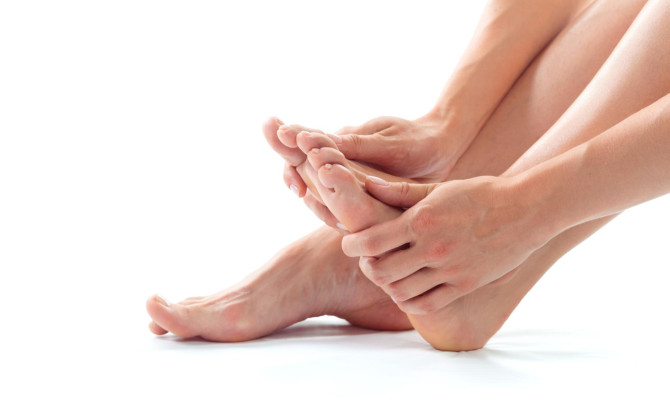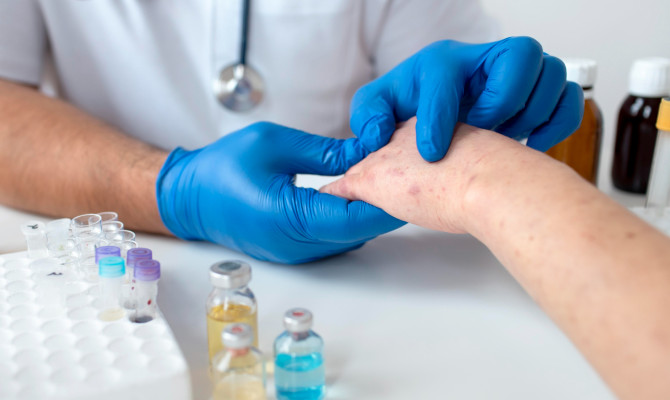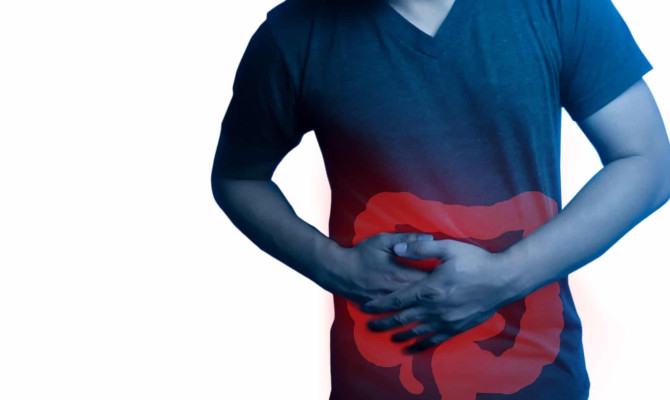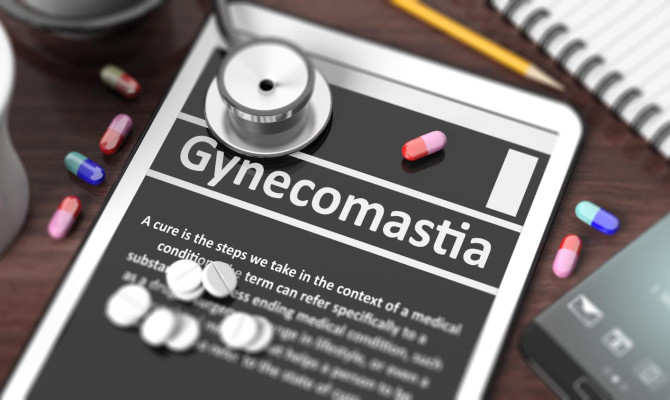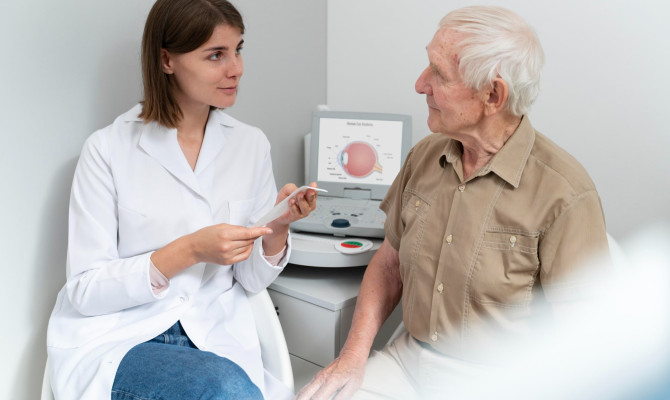Hypertension : Understanding the causes, symptoms, and management

- Hypertension
- 16 Aug 2023
Overview
What is Hypertension?
Hypertension, often known as high blood pressure, is characterized by an ongoing increase in blood pressure that presses on the arterial walls. To express it, systolic and diastolic values are used.
Hypertension is not only a major risk factor for many diseases, but it can also lead to other health problems. Treatment options that are beneficial include a healthy diet, consistent exercise, and weight management.1Overview | Researched based study from Cdc.gov If necessary, medication can also be used.
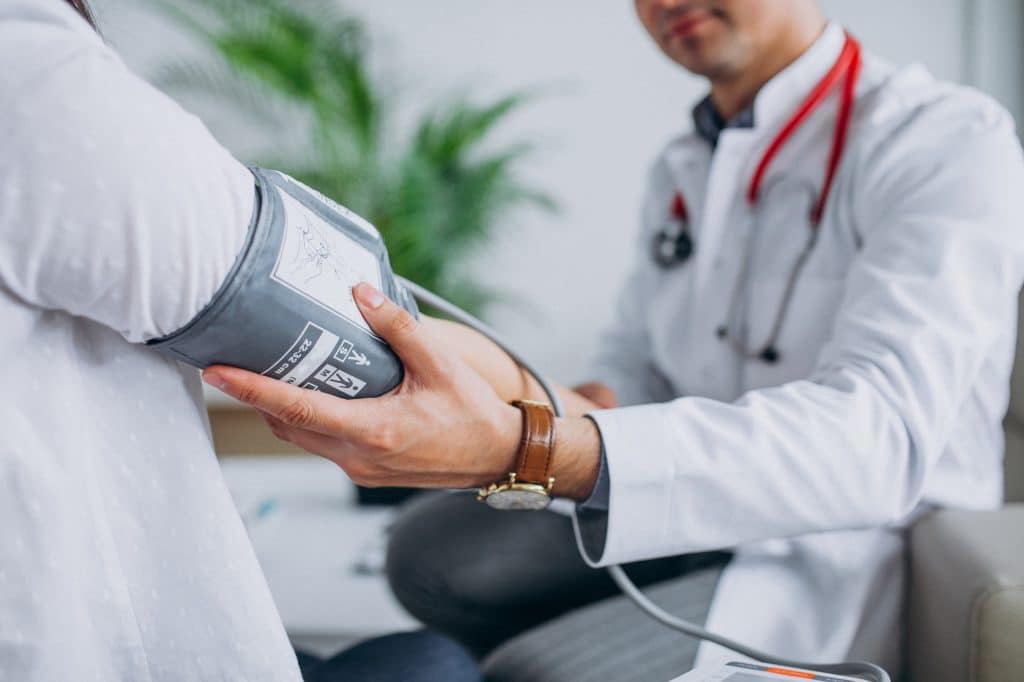
What are the standard blood pressure readings?
Normal range: Between a systolic pressure of less than 120 mm Hg and a diastolic pressure of less than 80 mm Hg. This is written as “120/80” mm Hg.
Hypertension: A systolic pressure of at least 130 mm Hg and a diastolic pressure of at least 80 mm Hg.1Overview | Researched based study from Cdc.gov
Stages
Different stages of hypertension
Elevated blood pressure
- A systolic pressure of 120 to 129 mm Hg and a diastolic pressure of less than 80 mm Hg are indicative of elevated blood pressure.
Stage 1
- It requires a diastolic pressure of 80 mm Hg or more and a systolic pressure of at least 130 mm Hg.
Stage 2
- Systolic and diastolic pressures of at least 90 mm Hg and 140 mm Hg, respectively. 1Stages| Researched based study from Cdc.gov
The intensity might vary based on other criteria, including age, gender, and other medical issues. These are only rough guidelines. Additionally, treatment varies according to each person’s particular situation.1Stages| Researched based study from Cdc.gov
Causes
What may the causes be?
About 90–95% of instances of hypertension are of the primary variety, sometimes referred to as essential hypertension.
Genetics
- The likelihood of getting high blood pressure rises in families with a history of the condition.3Causes| Researched based study from Nhlbi.nih.gov
Age
- As people age, their blood pressure tends to rise.
Overweight and obesity
- Obesity or being overweight might raise the risk.
Lack of exercise
- Blood pressure can be lowered by regular exercise.
Poor diet
- Excessive blood pressure can be caused on by a diet excessive in salt, fat, and cholesterol.2Causes| Researched based study from Nlm.nih.gov
Chronic stress
- Over time, this may raise blood pressure.
Other diseases
Less often occurring secondary hypertension is brought on by an underlying medical problem. Several instances of ailments include:
Sleep apnea
- In this situation, respiration is disrupted when you’re sleeping.1Causes| Researched based study from Cdc.gov
Kidney disease
- The ability of the body to regulate blood pressure may be affected by this.
Imbalance of hormones
- For example, a thyroid gland that is hyperactive might cause specific hormonal abnormalities.2Causes| Researched based study from Nlm.nih.gov
Abnormalities of the adrenal glands
- Having overactive adrenal glands can raise blood pressure.
Thyroid conditions
- An overactive thyroid can cause secondary hypertension.
Certain supplements and medicines
- Decongestants and birth control medications might raise your blood pressure.
Several circumstances bring it on, some of which may be unknown.3Causes| Researched based study from Nhlbi.nih.gov
Symptoms
Which symptoms are present?
Since hypertension may grow without showing any evident symptoms, it is sometimes known as the “silent killer”. But some people could go through the following signs and symptoms:
Headaches
- This symptom may be prevalent, particularly if blood pressure is significantly elevated.
Weakness and fatigue
- It may leave one feeling worn out and frail.2Symptoms| Researched based study from Nlm.nih.gov
Vision changes
- It may result in visual alterations like spots or blurry vision.
Chest pain
- Periodically, it might produce discomfort or chest pain that can mimic a heart attack.
Breathing difficulty
- Breathing may be challenging, especially while engaging in vigorous activity.2Symptoms| Researched based study from Nlm.nih.gov
Vulnerability
Who is at risk?
Ethnicity and race
- The illness is more likely to affect African and Hispanic Americans than Caucasians.3Vulnerability| Researched based study from Nhlbi.nih.gov
Lifestyle
- The risk can be increased by consuming a diet high in salt, saturated fats, and trans fats but low in fruits, vegetables, and whole grains. There is none or very little physical exertion. Hypertension is more likely to occur in older individuals.
Intoxicants
- Tobacco and alcohol use increases the risk.
Chronic diseases
- Illnesses, including diabetes and renal disease, increase the risk.3Vulnerability| Researched based study from Nhlbi.nih.gov
Diagnosis
What are the diagnostic factors?
It is frequently found using a variety of methods.
Primarily screening
- First, a doctor will use a sphygmomanometer or an automated device to collect many blood pressure measurements over some time. This is often done during a standard doctor’s appointment, although a home blood pressure monitor can also be used.
- In addition, the doctors could carry out other examinations to look for indications of underlying diseases or organ damage caused by hypertension.
Lab test
- Blood tests to examine renal function, cholesterol levels, and other health indicators are a few of these examinations.
- Examples include Liver function tests, HDL and LDL test, etc.4Diagnosis| Researched based study from Nhs.uk
- Tests of the urine to search for protein and different signs of renal disability.
Other test
- An electrocardiogram (ECG or EKG) looks for indications of irregularities or injury to the heart.
- Echocardiography to examine the composition and performance of the heart.
- A stress test designed to assess the heart’s response to physical stress.
- To look for signs of damage to other organs, imaging procedures like an MRI or CT scan are used.4Diagnosis| Researched based study from Nhs.uk
Management
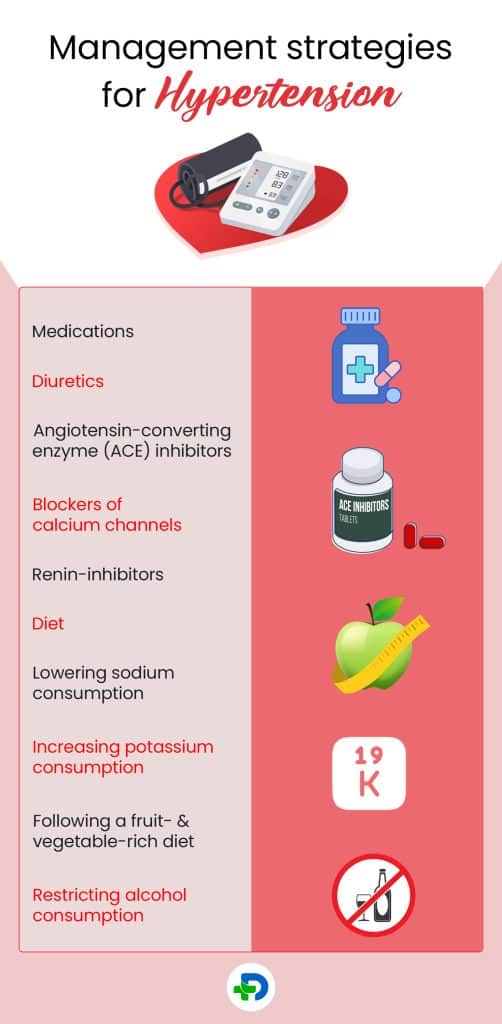
Management strategies for hypertension
Medications
A wide category of medicines is used to manage hypertension, including
Diuretics
- They help the kidneys eliminate extra salt and water from the body, which helps reduce blood pressure.
- Examples include furosemide, chlorthalidone, and hydrochlorothiazide.
Angiotensin-converting enzyme (ACE) inhibitors
- They inhibit the hormone angiotensin II’s synthesis, which can constrict blood vessels and raise blood pressure.
- Lisinopril, enalapril, and Ramipril are a few examples.4Management| Researched based study from Nhs.uk
Blockers of calcium channels
- By letting the blood artery walls’ muscles relax, they can aid in lowering blood pressure.
- Amlodipine, nifedipine, and diltiazem are a few examples.
Renin-inhibitors
- They prevent renin, an enzyme necessary for creating angiotensin II, from functioning. Aliskiren is one example.4Management| Researched based study from Nhs.uk
Diet
Diet is an important factor in controlling hypertension. Below are a few suggestions for diet.
Lowering sodium consumption
- A high salt diet might make you retain water. Limit your intake to 2300 mg daily, or even lower if recommended.
Increasing potassium consumption
- Sodium’s effects can be mitigated by potassium.
- Bananas, oranges, tomatoes, potatoes, sweet potatoes, beans, and yogurt are examples of foods high in potassium.5Management| Researched based study from Nlm.nih.gov
Following a fruit- and vegetable-rich diet
- They include a lot of fiber, potassium, magnesium, and other minerals that can help decrease blood pressure. Each day, at least five servings should be consumed.
Limiting saturated and trans fats
- Trans and saturated fats can cause hypertension and raise cholesterol levels. Aim to consume fewer foods high in these fats, such as fried meals, fatty meats, and full-fat dairy products.
Restricting alcohol consumption
- Blood pressure might rise as a result of excessive alcohol use. Limit your liquor intake to something like one beverage for women and two for men day to day.5Management| Researched based study from Nlm.nih.gov
Lifestyle
Changes in lifestyle to control hypertension
Lifestyle variables, in addition to prescription drugs and dietary modifications, can be significant.
Regular exercise
- Regular exercise can help you manage your stress, reduce your blood pressure, and strengthen your heart.
- Maintain a minimum of 150 minutes per week of moderately intense aerobic activity, such as brisk walking.
Stress reduction
- Over time, stress can cause blood pressure to increase. Exercises that promote relaxation, including yoga, meditation, or deep breathing, may be beneficial.5Lifestyle| Researched based study from Nlm.nih.gov
Regularly monitoring blood pressure
- Regular observation can aid in spotting changes and guarantee that it is under control.5Lifestyle| Researched based study from Nlm.nih.gov
Complications
What are the associated complications?
Heart disease
- heart muscle stiffness and thickening. Over time, this could lead to heart failure, coronary artery disease, and other problems.
Stroke
- It may deteriorate brain blood vessels, raising the chance of a stroke.1Complications| Researched based study from Cdc.gov
Kidney disease
- Reduces the kidneys’ capacity to filter out waste from the body by harming their blood vessels.
Coronary artery disease
- The arteries in the legs and feet may constrict. As a result, they decrease blood flow.
Sexual dysfunction
- This can result from problems with the blood supply to the genitals.1Complications| Researched based study from Cdc.gov
Outlook
What’s the outlook for hypertension?
- The severity of the disease and the success of treatment are just two of the many variables that affect the outlook.
- It can cause several consequences if ignored or improperly managed.
- It’s crucial to work closely with a physician to create a personalized management strategy for hypertension, which may involve medication and dietary adjustments.
Any feedback on this article?
 This Articles content was accurate
This Articles content was accurate Very Informative Article
Very Informative Article I have a question or a comment
I have a question or a comment
 This article contains inaccurate content
This article contains inaccurate content This article was not helpful
This article was not helpful I have a question or a comment
I have a question or a comment
We appreciate your helpful feedback!
Checkout our social pages
References
-
Centers for Disease Control and Prevention
High Blood Pressure Symptoms and Causes | Overview | Stages | Complications
-
National Library of Medicine
Hypertension | Causes | Symptoms
-
National Heart, Lung and Blood Institute
HIGH BLOOD PRESSURE-Causes & Risk factors | Vulnerability
-
National Health Service
Overview-High blood pressure (hypertension) | Diagnosis | Treatment
-
National Library of Medicine
Lifestyle measures for treating hypertension | Management | Lifestyle












